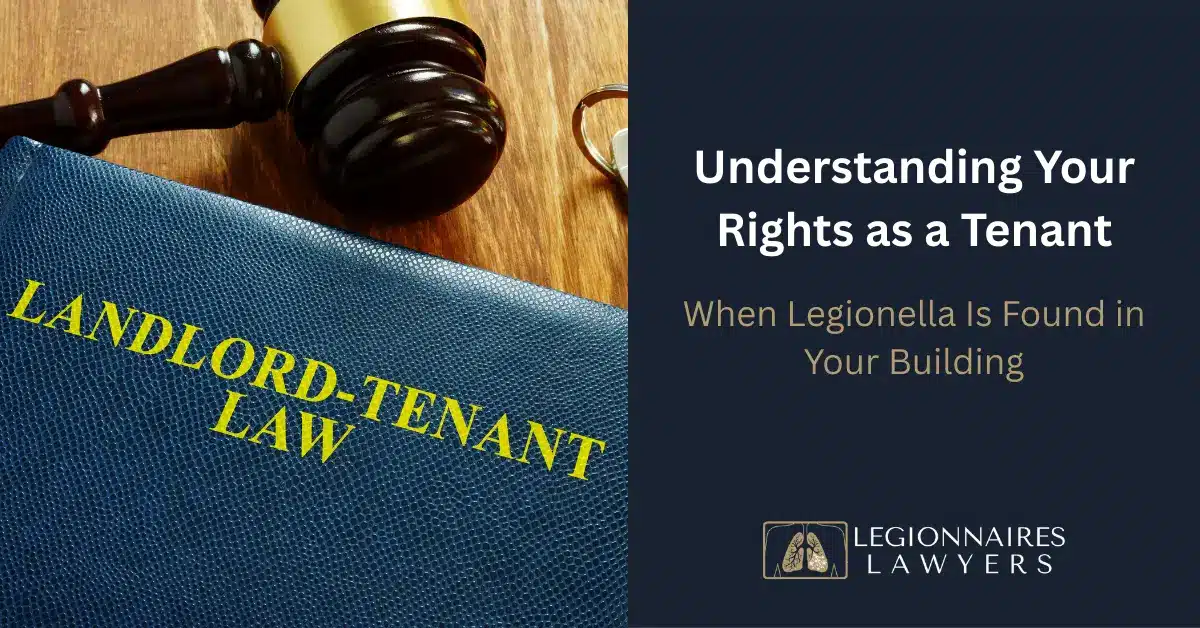
What Is Legionella and How Does It Affect Tenants?
Legionella is the bacteria that cause Legionnaires’ disease, a serious type of pneumonia contracted by inhaling contaminated water droplets. In U.S. rental housing, Legionella concerns typically arise from plumbing systems, cooling towers, hot tubs, or decorative fountains.
While there is no nationwide “Legionella law” for apartments, landlords still have duties under the implied warranty of habitability, state housing codes, and general negligence principles. If Legionella is found in your building, your landlord must take action to protect tenants.
Tenant Rights and Legal Responsibilities of Landlords Regarding Legionella
1. Right to a Safe and Habitable Home
Every state recognizes a landlord’s duty to provide housing that is safe, sanitary, and fit for human habitation. Failure to maintain water systems can be a breach of this warranty. Landlords should manage Legionella risk through proper water temperature settings, flushing stagnant water, and maintaining equipment like boilers, cooling towers, or storage tanks.
2. Right to Information About Health Hazards
While there is no federal rule requiring landlords to disclose Legionella results in domestic plumbing, tenants have a right to be informed if a health hazard exists.
Some states and cities—such as New York City, which strictly regulates cooling towers—do impose notification and reporting duties. Even when not legally mandated, landlords should communicate findings and provide safety instructions.
3. Right to Request a Risk Assessment
If you suspect a water system problem—like lukewarm hot water, infrequently used outlets, or visible biofilm—you can ask your landlord what steps are being taken to prevent Legionella. If concerns remain, you can contact your local health department or housing authority, which may inspect the property under state/local housing codes.
4. What To Do If You Develop Symptoms
Legionnaires’ disease symptoms include cough, fever, shortness of breath, muscle aches, and headaches. Seek medical care immediately—early treatment is crucial. If your illness is traced to the building’s water system, you may have grounds to pursue compensation through a personal injury or premises liability claim.
5. Right to Compensation for Illness Caused by Negligence
If Legionnaires’ disease results from a landlord’s failure to maintain safe water systems, you may be entitled to damages for medical bills, lost wages, pain and suffering, and long-term health impacts. To strengthen your claim, keep detailed records of:
- Your diagnosis and treatment
- Housing conditions
- Communications with your landlord
- Any public health reports linking the property to Legionella
What Steps Should a Landlord Take If Legionella Is Found?
Landlords who discover or are alerted to Legionella in their property should act promptly by:
- Conducting a water system assessment to locate sources of contamination
- Implementing remedial actions such as thermal disinfection, chemical treatment, or system flushing
- Working with water management professionals and following standards like ASHRAE 188 (industry guideline for building water systems)
- Notifying health departments if required by state/local law
How Often Should a Landlord Conduct a Legionella Risk Assessment?
There is no fixed U.S. requirement for apartments, but risk should be evaluated periodically and whenever systems change (new plumbing, equipment, or prolonged shutdowns). Public health agencies, including the CDC, recommend proactive water management plans in multifamily housing, especially for higher-risk populations.
Can Tenants Be Held Responsible for Legionella Issues in Their Rental Property?
No—tenants are not legally responsible for preventing Legionella contamination. Landlords must maintain safe systems. However, tenants should follow basic safety guidance:
- Run faucets and showers after long periods of disuse
- Report water temperature problems or stagnant outlets
- Keep personal humidifiers, spas, or decorative fountains clean
What Should a Tenant Do If They Are Concerned About Legionella in Their Property?
If you’re worried about your building’s water safety:
- Notify your landlord in writing.
- Request details on maintenance or water management steps.
- If unaddressed, contact your local health department or housing authority for inspection.
What Should Tenants Do If They’ve Been Diagnosed with Legionnaires’ Disease?
If you’ve been diagnosed with Legionnaires’ disease and suspect it was caused by exposure to Legionella in your building, you may be entitled to compensation. Consult a Legionnaires’ disease lawyer to guide you through the legal process. A lawyer can help gather evidence and ensure you receive compensation for medical costs, lost wages, and other damages.
Don’t hesitate to seek legal advice if your landlord didn’t properly manage Legionella risks.


